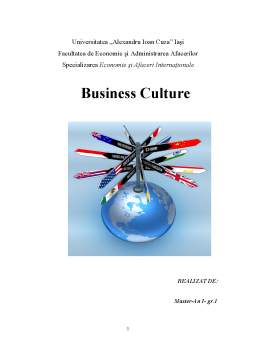Cuprins
- Introduction 3
- 1. Cultural influences affect business? 4
- 2.Cultural norms and rules 7
- Conclusion 8
- References 9
Extras din referat
INTRODUCTION
A strong culture must be strategically adaptive and appropriate for her to support the company's orientation towards development and performance. But to discuss the strategic fitness must be a coherent strategic concern in that company.
In order to achieve high performance, companies must take into account in setting strategies and culture of their external environment. Thus, in research, Denison set the following four types of strategic culture: culture based on adaptability, culture based on mission, culture focused on members of traditional cultures.
”Culture based on adaptability are focused on flexibility and change, as required firms operating in an extremely dynamic environment” If the external environment do not show rapid change based on mission cultures are most effective. They afford a high degree of performance by sharing the vision of companies about their goals with enthusiasm, all their members. Cultures focused on members with focus on meeting the needs of members in hopes of a high level of performance of companies, concerned the change of environment. In a stable environment, traditional cultures are most effective.
Both culture based on adaptability and the focus on members, are crops that can be developed under a dynamic environment, supporting the strategies of firms, whereas cultures based on traditional mission and can be developed under a less dynamic environment. When the strategic objectives and cultural values of firms consistently reinforce each other, where culture is adaptive and appropriate strategic and important components of cultural, strategic and structural are consistently compatible and interconnected.
1. Cultural influences affect business?
One of the most difficult tasks of a businessman operating in a global framework is to understand the cultural influences that affect their businesses. In practice, several factors are working simultaneously and is always extremely difficult to isolate one of them. Frequently, cultural differences were found guilty for any noticeable difference between countries. But these differences result from religious beliefs, the structure of society or simply of different laws?
I chose to talk about culture in the family and culture in education and business ethics.
FAMILY
Family role varies from culture to culture, and roles as family members vary. Some cultures, we find differences in family size in anjagarea women, as well as other factors of interest to a businessman. Companies familiar with interacting with families in a society can not expect to find the same pattern elsewhere.
In the U.S. there is a trend towards the dissolution of the traditional family. The people that castaoresc increasingly later and divorcing more often, the typical family consisting of a father, mother and children became increasingly less common. More recently, a similar trend in Western Europe had as consequence a growing number of households even in countries where population is declining.
In many societies, particularly in Asia and Latin America, the role of men as head of the family remains pronounced. Some cultures even encourage the birth of men in detriment of women. In many cultures, 105 boys are born for every 100 girls. But in China the number of boys per 100 girls is 118.5, and 116 in South Korea. This male dominance coincided with a lesser rate of women in particopare workforce outside the home. This situation results in a lower income per family. In many countries in Eastern Europe and Germany, one child per family is fast becoming a rule, while families in many developing countries are still high by Western standards.
Preview document
Conținut arhivă zip
- Business Culture.doc
























